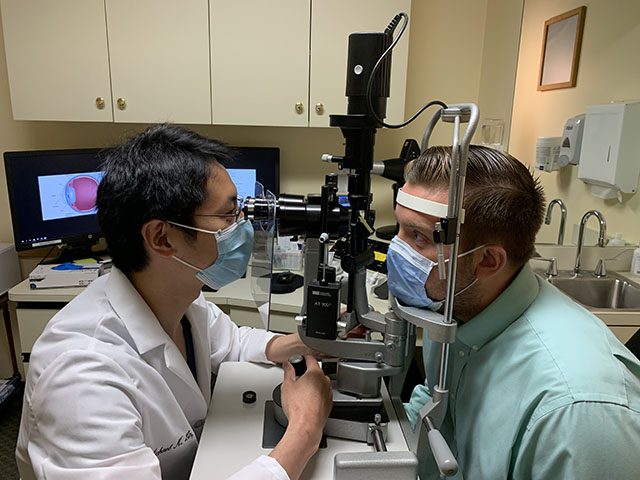Now more than ever, it’s important to take care of yourself and get the medical care you need. Protecting your eyesight is no different. In an interview with Boston Magazine, Michael M. Lin, MD, a glaucoma specialist at Mass Eye and Ear, shared ways to preserve your eye health, including scheduling a comprehensive eye exam.
-
Watch Your Diet
Developing good eating habits isn’t just proven to promote your overall health. It’s also a powerful and effective way to ward off vision problems. Maintaining a healthy weight can lower your odds of type 2 diabetes, the leading cause of blindness in working-age adults.
“Poor nutrition can definitely affect your eye health,” said Dr. Lin. “Maintaining a healthy diet and controlling your blood sugar and blood pressure now are not only important for your overall health, but they are key to avoiding eye issues later on in life.” Development of type 2 diabetes is often related to diet and exercise, and diabetes can lead to earlier formation of cataracts and problems with the retina, the part of the eye that detects light and sends signals to the brain for vision.
Not sure what to shop for? Try adding these nutrient-rich foods to your grocery list to reduce your risk of vision problems.
- Fish, particularly salmon and tuna
- Non-meat protein sources like eggs, nuts, and beans
- Citrus fruits
- Green leafy vegetables
- Lean meat and poultry
-
Wear Your Sunglasses
Sunglass lenses with proper UV protection limit exposure to the sun’s ultraviolet rays, which can speed up the development of cataracts and increase the risk of macular degeneration, a major cause of permanent vision loss in people over age 60.
“UV exposure from sunlight can damage your eye and can cause growths and bumps on the eye that can become irritating,” said Dr. Lin. The most common sun-related growth is a pterygium, which usually appears as a fleshy white bump growing on the side of the cornea closer to the nose. “Wearing sunglasses in bright conditions is a simple step that many people already do, and the good news is that in addition to keeping your eyes comfortable, it can limit your risk of developing eye problems.”
It’s just as important to wear sunglasses during the winter months because UV rays are still reaching the eyes. Sunglasses also protect against harm from wind and debris. “Skiers, snowboarders and mountain climbers are especially prone to ‘snow blindness’ or photokeratitis, which is like a sunburn of the cornea from prolonged UV ray exposure. This is worsened by the UV rays reflecting off snow,” noted Dr. Lin.

-
Schedule an Eye Exam
Even if you aren’t experiencing any vision loss, a regular eye exam is key to spotting eye diseases early and getting the right treatment. Dr. Lin said a routine eye screening with an optometrist who tests your vision and checks your eyes for diseases should be done every one to two years. Those who are age 40 and up should schedule a comprehensive eye exam — particularly if they have a family history of eye disease. During a comprehensive eye exam, a doctor will perform a series of tests to completely evaluate the health of your eyes and vision.
“My advice is to schedule an eye exam at age 40 and start having your eye health monitored closely by an optometrist or general ophthalmologist,” said Dr. Lin. “Taking this step can help us catch eye diseases like cataracts, glaucoma, and diabetic retinopathy earlier on, which is important because treating these diseases at early stages is easier and better for your vision than waiting until advanced stages to get care.”
-
Use Eye Protection
With people spending more time at home due to COVID-19 and stay-at-home orders, there has been an increase in house projects. Whether you’re replacing a door, sanding prior to painting, or working with power tools, it’s important to wear eye protection. Experts recommend safety goggles with shatterproof lenses.
Eye protection is also recommended when social distancing isn’t possible.
“There is thought that COVID-19 can potentially spread via contact with the eye, so face shields and eye protection, such as goggles, can provide an extra layer of safety,” said Dr. Lin.
-
Practice Good Contact Lens Hygiene
Wearing contact lenses can be a nice alternative to eye glasses, but it’s crucial to follow the proper protocol for inserting and taking out contacts. This includes removing and properly cleaning them before bed as sleeping in contact lenses increases your risk of infection.
Dr. Lin is quick to point out that following these tips doesn’t guarantee that your eyes will stay disease-free. Thanks to innovations in eye care, though, he said most of his patients suffering from glaucoma and other eye diseases maintain good working vision for their entire lives, and patients who undergo cataract surgery are often seeing much better the day after surgery. Helping patients see better and protecting their vision, he said, is the most rewarding part of his job.
“One of the top reasons being an ophthalmologist is so fulfilling is because with certain procedures like cataract surgery, we can help patients go from being barely able to see the big “E” on the chart one day to 20/20 vision the next day,” said Dr. Lin. “No matter what your eye problem is, we’re going to be with you to manage it. In many cases, we can protect your vision from getting worse, and we can often make your vision better so that you can get back to your normal life.”
Boston Magazine developed the original article, “The 3 Most Important Things You Can Do to Protect Your Eyesight,” in partnership with Mass Eye and Ear. To learn more about how to maintain good eye health and to schedule a comprehensive eye exam, visit MassEyeAndEar.org or call 617-573-3202. Mass Eye and Ear is here to safely provide the care you need now with in-person appointments and virtual visits available.
About Our Expert
 Dr. Michael Lin is a glaucoma specialist who performs a wide range of procedures, including minimally invasive glaucoma surgery and cataract surgery. He sees patients at the Longwood, Malden and Main Campus locations.
Dr. Michael Lin is a glaucoma specialist who performs a wide range of procedures, including minimally invasive glaucoma surgery and cataract surgery. He sees patients at the Longwood, Malden and Main Campus locations.
What causes floaters in eye ? Someone told me it could be from not drinking enough water .
Hi Dawn, here’s more information on eye floaters from the National Eye Institute. Thanks for reading our blog post and for your comment. https://www.nei.nih.gov/learn-about-eye-health/eye-conditions-and-diseases/floaters
Thanks for your comment and for reading. Dr. Lin says, “Floaters are typically the word people use to describe the drifting cobweb of cloudiness that is caused by posterior vitreous detachment. There is jelly called vitreous that fills the inside of the eye. With time, the jelly liquifies and shrinks, and then it separates from the retina that lines the inside wall of the eye. Once free, the vitreous can drift around in the eye, and the shadows caused by the vitreous as light passes through it to the back of the eye can lead to seeing floaters. As far as I understand, not drinking enough water is not a major cause of floaters, and posterior vitreous detachment is a common change that develops with age.”
I would be interested in hearing about the science behind vitamins targeting eye health.
Thanks Mark for checking in. Dr. Lin states, “Some of the best evidence that vitamins can help with eye health comes from the Age-Related Eye Disease Study (AREDS). This study showed evidence that taking the AREDS formula would help prevent worsening of age-related macular degeneration.” Here’s more information: https://www.nei.nih.gov/research/clinical-trials/age-related-eye-disease-studies-aredsareds2/aredsareds2-frequently-asked-questions
I have glaucoma, is the pressure number the same for all patients, and if not how is that determine. I have 2 stents in both eyes for glaucoma, do they get blocked and if they do what is the procedure to fix that? Thanks for your help.
Hi Bertha. We asked Dr. Lin, who said: “The eye pressure in each patient is unique, and your eye doctor determines a target pressure based on a number of factors that include how advanced your glaucoma is, your life expectancy, and your previous history of eye pressures and glaucoma testing. Stents in the eye such as the iStent, Hydrus, or Xen can help lower pressure. It is possible that these stents can get blocked as the eye heals from surgery, but it will be important to get a full eye examination and testing in order to determine whether this blockage is significant and whether it is possible or worth it to unblock the stents.”
I liked how you pointed out to have healthy diet so you wont have vision problems. My whole family wears glasses and we don’t really eat that great and now its good to know to eat healthy so I can help my kids to not have terrible vision. I will be sharing this with my family and keeping this in mind for my kids.